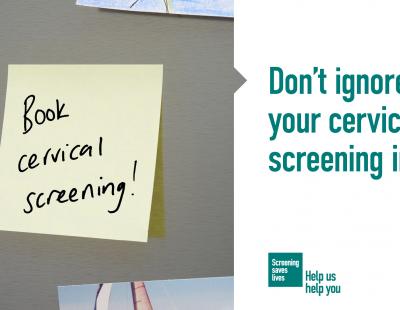It’s all too easy to put off booking your test, but you shouldn’t ignore your invite. Sadly two women die every day from cervical cancer in England. Screening and early treatment could save your life.
Cervical cancer is one of the most preventable cancers and getting screened can help stop it before it starts.
What is cervical screening?
Cervical screening (a smear test) checks the health of your cervix. The cervix is the opening to your womb from your vagina. It's not a test for cancer, it's a test to help prevent cancer.
All women and people with a cervix aged 25 to 64 should be invited by letter. During the screening appointment, a small sample of cells are taken from your cervix.
The sample is checked for certain types of human papillomavirus (HPV) that can cause changes to the cells of your cervix. These are called "high risk" types of HPV. If these types of HPV are not found, you will not need a test for a further three years.
If these types of HPV are found, the sample is then checked for any changes in the cells of your cervix. These can then be treated before they get a chance to turn into cervical cancer.
Cervical screening tests should not be painful, but if you are worried that you may find the test uncomfortable, talk to your nurse or doctor about this.
You can request a smaller speculum and stop at any time if you feel uncomfortable. The test should be over within five minutes – a few minutes of your time can help stop cancer before it starts. The nurse or doctor will tell you when you can expect your results letter.
Cllr Maureen McLaughlin, cabinet member for public health and wellbeing, said: “It’s so important to attend your cervical screening test when you receive your invite letter. People often avoid having the test because they feel nervous or embarrassed about having it done, but it’s nothing to worry about, it only takes a couple of minutes, and it could save your life.
“This New Year, make it your resolution to attend your screening test and encourage your friends and loved ones to book theirs too.”
Warrington’s director of public health, Thara Raj, said: “It is estimated that in England, cervical screening prevents 70% of cervical cancer deaths and that if everyone attended screening regularly, 83% of cervical cancer deaths could be prevented. So don’t delay and book your appointment as soon as you receive your invitation.”
For more information about cervical screening, including a short video about how the test is done, visit nhs.uk/cervicalscreening.
